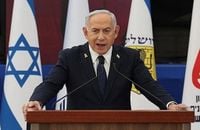In a controversial statement that has sparked outrage, Israeli National Security Minister Itamar Ben Gvir has called for a complete halt to humanitarian aid entering the Gaza Strip. He argued that the only assistance that should be permitted is one that encourages residents to emigrate voluntarily. This declaration comes amid escalating tensions and military operations in the region.
According to Al-Qahira Al-Ikhbariya, Ben Gvir emphasized that no aid should be allowed into Gaza until the hostages taken by Hamas are released. His remarks reflect a hardline stance that prioritizes military objectives over humanitarian considerations, raising alarms among human rights advocates and international observers.
“The only aid that should enter Gaza is that which encourages people to leave,” Ben Gvir stated, further asserting that food and other forms of assistance should be strictly prohibited. His comments have drawn sharp criticism from various quarters, including humanitarian organizations that argue such a blockade could exacerbate the already dire conditions faced by civilians in Gaza.
The Israeli government’s position appears to be increasingly aggressive, with Ben Gvir advocating for a siege on Gaza and the potential for famine as a means of exerting pressure on Hamas. This approach has been met with widespread concern, as it raises ethical questions about the treatment of civilians in conflict zones.
In addition to Ben Gvir's statements, an Israeli military official has indicated that the military operations in Gaza will not be expanded without prior coordination with the United States and other Middle Eastern countries, particularly in light of an upcoming visit from former President Donald Trump. This suggests a complex interplay between military strategy and diplomatic relations, as the Israeli government navigates its actions on the ground with the implications of international politics.
Meanwhile, the humanitarian situation in Gaza continues to deteriorate. Reports indicate that the blockade has significantly limited access to essential supplies, including food, medical aid, and clean water. Organizations like the United Nations have warned that the population is at risk of severe shortages, which could lead to widespread suffering.
In Egypt, the price of gold has surged, with reports indicating an increase of about 95 Egyptian pounds in recent transactions. This rise in gold prices may reflect broader economic pressures in the region, exacerbated by the ongoing conflict.
Moreover, Algeria has been experiencing considerable retaliatory strikes in multiple states, highlighting the regional instability fueled by the ongoing conflicts. The Mauritanian national football team has also recently bid farewell to the World Cup qualifiers, a reminder of how geopolitical tensions can overshadow even sporting events.
As the situation evolves, the international community watches closely, with many calling for a reassessment of strategies that prioritize military objectives over humanitarian needs. The debate surrounding aid to Gaza is likely to continue, as the implications of such policies resonate far beyond the immediate conflict.
Ben Gvir’s comments and the Israeli government’s stance could have lasting repercussions on the ground, potentially impacting peace efforts and the humanitarian landscape in the region. Observers are left to ponder the balance between military necessity and humanitarian responsibility.
In conclusion, the call to restrict aid to Gaza raises critical ethical and humanitarian questions that demand urgent attention. As the situation unfolds, the need for dialogue and a reconsideration of strategies that prioritize human life over military objectives becomes increasingly apparent.


